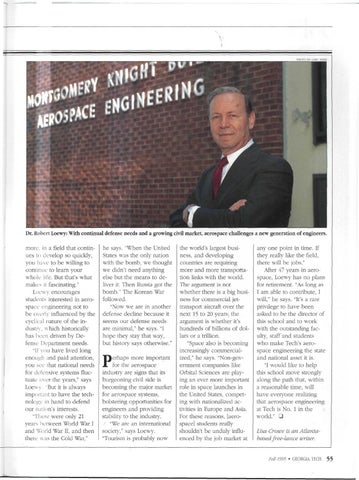PHOTO BY GARY MEEK
Dr. Robert Loewy: With continual defense needs and a growing civil market, aerospace challenges a new generation of engineers. more, in a field that continues to develop so quickly, you have to be willing to continue to learn your whole life. But that's what makes it fascinating." Loewy encourages students interested in aerospace engineering not to be overly influenced by the cyclical nature of the industry, which historically has been driven by Defense Department needs. "If you have lived long enough and paid attention, you see that national needs for defensive systems fluctuate over the years," says Loewy. "But it is always important to have the technology in hand to defend our nation's interests. "There were only 21 years between World War I and World War II, and then there was the Cold War,"
he says. "When the United States was the only nation with the bomb, we thought we didn't need anything else but the means to deliver it. Then Russia got the bomb." The Korean War followed. "Now we are in another defense decline because it seems our defense needs are minimal," he says. "I hope they stay that way, but history says otherwise."
P
erhaps more important for the aerospace industry are signs that its burgeoning civil side is becoming the major market for aerospace systems, bolstering opportunities for engineers and providing stability to the industry. "We are an international society," says Loewy. "Tourism is probably now
the world's largest business, and developing countries are requiring more and more transportation links with the world. The argument is not whether there is a big business for commercial jettransport aircraft over the next 15 to 20 years; the argument is whether it's hundreds of billions of dollars or a trillion. "Space also is becoming increasingly commercialized," he says. "Non-government companies like Orbital Sciences are playing an ever more important role in space launches in the United States, competing with nationalized activities in Europe and Asia. For these reasons, [aerospace] students really shouldn't be unduly influenced by the job market at
any one point in time. If they really like the field, there will be jobs." After 47 years in aerospace, Loewy has no plans for retirement. "As long as I am able to contribute, I will," he says. "It's a rare privilege to have been asked to be the director of this school and to work with the outstanding faculty, staff and students who make Tech's aerospace engineering the state and national asset it is. "I would like to help this school move strongly along the path that, within a reasonable time, will have everyone realizing that aerospace engineering at Tech is No. 1 in the world." • Lisa Crowe is an Atlantabased free-lance writer.
Fall 1995 • GEORGIA TECH
55
